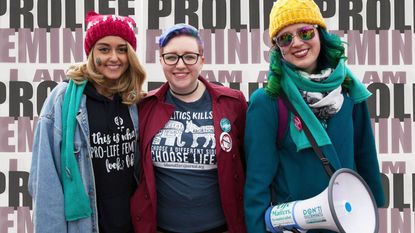
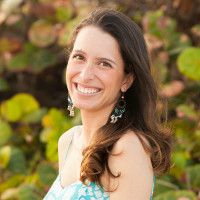
Without basic rights, women can't be free," Rosemary Geraghty yells into a megaphone. "Abortion is a tool of the patriarchy!" She surveys the crowd marching down Constitution Avenue in Washington D.C. and shouts her slogan again. Her short hair is dyed blue and purple. An anti-Trump pin adorns her jacket, a button proclaiming "this is what a pro-life feminist looks like" above it.
It's the second time in a week that Geraghty, 20, has marched against the grain. On January 21, she brought her pro-life views to the Women's March on Washington while protesting President Donald Trump's "disturbing disregard for the inherent dignity of women and certain minority groups." Today, she's an atheist among the religious, speaking out against abortion at the March for Life, an anti-choice rally held in D.C. each year for the anniversary of Roe v. Wade. As Geraghty puts it, she marches "for equal rights for every human being, born and pre-born."
The University of Pittsburgh junior is a member of the secular anti-abortion movement, a small but growing group of mostly young adults who place abortion in the realm of human rights, not theology. And while 61% of American Millennials believe abortion should be legal, young secular pro-lifers are gaining steam in communities online and around the country. The nonprofit where Geraghty serves as social media coordinator, Life Matters Journal, has grown its Facebook following by 27 percent in the last month, and other groups like it have made similar gains. Of Students for Life of America's 1,100 college campus chapters, 115 of them sprung up in the last few months of 2016 alone.

Scenes from the March for Life, January 2017
The heightened agita of the current political climate might play a role in that growth among young people. So might the appeal of a newer, non-religious voice in the abortion debate (35 percent of adult Millennials don't identify with a religion). And then there's the pushback from mainstream feminists, who are overwhelmingly pro-choice and many of whom advocate that all feminists should be. Their rejection of secular anti-abortionists seems to have drawn more attention to the pro-life cause: Days before Geraghty attended the Women's March on Washington, secular pro-life group New Wave Feminists was removed from the march's partnership list—and their membership spiked by almost 10,000 as a result.
Out of the noise of an increasingly heated abortion debate in America, one thing can be heard loud and clear: There's a new kind of feminist shouting through the megaphone.
Geraghty became an atheist in high school. She was raised Catholic in Bensalem, Pennsylvania, a suburb of Philadelphia, but started rejecting her faith as a teenager. "I'm bisexual," she says, "and it made me question the Catholic church's teachings about sexuality."
That's when Geraghty also began questioning her stance on abortion. Her mom is pro-choice, and Geraghty had always followed her lead. But digging through Tumblrs and feminist blogs discussing abortion led Geraghty to a site about "embryology," a branch of biology that studies embryos and their development, and she began to formulate the belief that life begins at fertilization.
Stay In The Know
Marie Claire email subscribers get intel on fashion and beauty trends, hot-off-the-press celebrity news, and more. Sign up here.
"I couldn't see any moral difference in the stages of development," she explains.
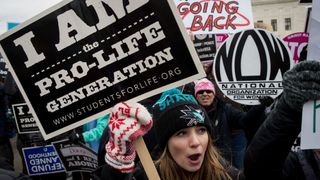
A pro-life protester at the March for Life rally in January
"At the moment of fertilization, a new organism's life has begun," argues 28-year-old Aimee Murphy, the founder of Life Matters Journal, where Geraghty works. "They are new, unique, differentiated, and whole."
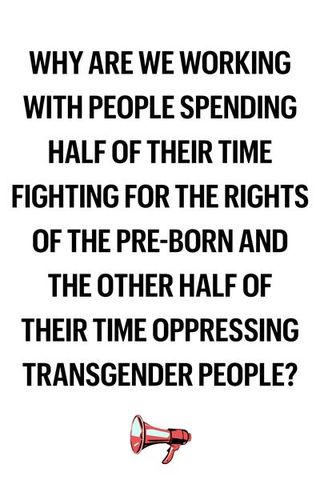
The precise moment when life begins is, of course, a critical fulcrum in the abortion argument. There is no consensus in the scientific community as to when a human life "starts," and the American College of Obstetricians and Gynecologists (ACOG) maintains that pregnancy has not occurred until a fertilized egg implants into the lining of a woman's uterus, 6 to 12 days after fertilization.
Despite many pro-lifers' rejection of contraception that prevents this implantation, both Secular Pro-Life founder Kelsey Hazzard and Geraghty say that they aren't against hormonal contraceptives and IUDs, since they don't think the science is conclusive enough. And neither of them is opposed to terminating ectopic pregnancies. "In all cases where the life of the mother is threatened, I support the removal of the fetus," Geraghty says.
By speaking in terms of biology instead of theology, secular abortion opponents separate themselves from their religious counterparts—the group that has dominated the movement thus far. They also seek to pull away from pro-life's more extremist, reactionary, and "exploitive of the unborn" factions, which are a turn-off for many Millennials who traffic in sentiments like "Love is Love is Love." When her group passed a truck papered with photographs of the body parts of fetuses with the words "murder" on it and a photo of Planned Parenthood President Cecile Richards with blood photoshopped onto her hands, Murphy muttered under her breath, "Ugh, why am I pro-life again?"
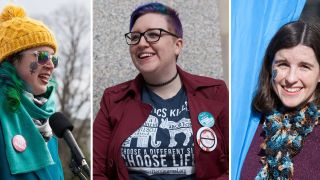
'From left: Secular pro-lifers Aimee Murphy, Rosemary Geraghty, and Kelsey Hazzard
According to a 2016 Pew Research Center poll, the number of people under the age of 30 who believe abortion should be legal in all or most cases is up 11 percent since 2007. But Geraghty says that when she and her friends hold Choose Life events on campus, many students stop to talk and seem interested in hearing why she considers abortion a human rights issue. She likes debating with pro-choice students, she says, because "there are great reasons to be pro-choice," especially when speaking about body autonomy and the legal rights of women.
This would seem like an uncommon flexibility of perspective for an abortion opponent to have, but it's just another of the many ways that Geraghty and her peers are setting themselves apart from the mainstream abortion movement, which they view as far too closed-minded.
"They're in bed with a lot of unsavory people," says Geraghty of the groups that oppose same-sex marriage or transgender rights. She sees that as a barrier to liberals and atheists coming into the movement. "I know multiple trans pro-life activists who have said, 'Why are we working with people spending half of their time fighting for the rights of the pre-born and the other half of their time oppressing transgender people?'"
Out of the 10 secular pro-lifers MarieClaire.com interviewed for this article, seven were strongly "Never Trump"—even amongst a mix of Republicans, Democrats, and Independents.
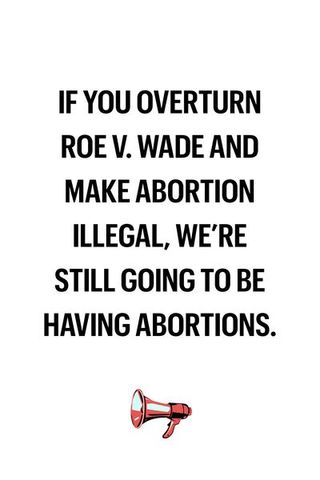
Many are also for defunding Planned Parenthood, citing the belief that federal money should be redirected to federally qualified health centers and rural health centers that do not provide abortions and which far outnumber Planned Parenthood. At the march, Murphy led the group in the chant: "Hey, hey, ho, ho, Planned Parenthood has got to go."
Federally qualified health centers don't actually provide as many contraceptive services as Planned Parenthood, nor would funds—should money be rerouted from Planned Parenthood to these centers—necessarily be used for women's health. Rural health clinics are "not required to provide family planning services and do not have to serve low-income patients," according to the Washington Post.
But unlike other pro-lifers, secular abortion opponents are less focused on changing law than they are on changing minds. Destiny Herndon-de la Rosa, the 33-year-old founder of New Wave Feminists, argues that establishment anti-abortion organizations don't spend enough energy on understanding that women often don't feel supported by society in terms of child care and healthcare, and turn to abortion as a solution, when they otherwise might make a different decision if they had more resources.
"If you overturn Roe v. Wade and make abortion illegal, we're still going to be having abortions," she says—at least until society becomes "pro-lifetime, not just pro-life." Geraghty says she intentionally focuses her activism on cultural change for this reason. "I support equal legal protections for all human beings, but I think overturning Roe v. Wade could lead to unsafe abortions if our country doesn't respect pre-born life."
Perhaps going to an even further extreme than some of their religious counterparts, many members of the secular movement believe that abortion is a violent act against a human being, and that there should therefore be no exceptions for those impregnated by rape or incest. Life Matters Journal campaigns to end abortion alongside the death penalty, torture, euthanasia, unjust war, abuse, and rape. "Our specific mission as an organization is to educate on these issues and their bias in culture," says Murphy. "Hopefully in time, abortion will both be illegal and unthinkable."
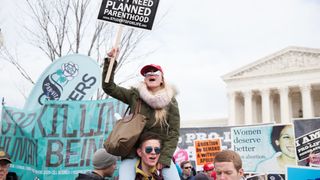
Young protesters at the March for Life on January 27, 2017 in Washington, D.C.
Though secular abortion opponents are trying to reach a broader audience, some critics say that ultimately, their messaging may not work. "They haven't come up with anything that trumps the bodily rights argument," says Matt Dillahunty, who, with his wife Beth Presswood, is involved with the atheist community in Austin, Texas, and has attended atheist conventions with Secular Pro-Life. "I don't know what justification you have to say we as a society have a legal right to force a woman to remain pregnant against her will."
Dillahunty and Presswood point out that there may not be that many differences between the secular and religious pro-life movements after all—Life Matters Journal's "consistent life ethic" stance is, for example, an ideal that was first coined by a Catholic cardinal. Hazzard, who identifies as an atheist, says the emails she receives from one secular anti-abortion group she works with have "religious overtones."
Convincing feminists that they're on the same side is perhaps the secular movement's biggest uphill battle, especially in the wake of the ideological tug-of-war highlighted by the Women's March over whether you can be both pro-woman and pro-life. Writer Jessica Valenti tweeted that she was "horrified" when the march partnered with an anti-abortion organization, saying, "Inclusivity is not about bolstering those who harm us." Linda Sarsour, one of the chairs of the Women's March, told theNew York Times: "If you want to come to the march, you are coming with the understanding that you respect a woman's right to choose."
Herndon-De La Rosa says she was "disappointed" that the march didn't stand behind their initial outreach, or stand behind what she feels is a truer sense of inclusion. "Feminism should be about exchanging ideas," she says, "not shutting down dialogue and excluding those you disagree with."

Lorena O'Neil is a reporter and photojournalist based in New Orleans covering reproductive health, gender, culture, and politics. She has written for The Atlantic, Elle, Esquire, Jezebel, and NPR.
-
 The 2024 Met Gala Is Almost Here—Here's How and When to Stream It Live
The 2024 Met Gala Is Almost Here—Here's How and When to Stream It LiveArmchair fashion critics, it's our time.
By Quinci LeGardye Published
-
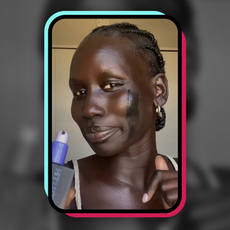 Why Youthforia's New Foundation Is Under Fire
Why Youthforia's New Foundation Is Under FireThis isn't the way to do inclusive shades.
By Halie LeSavage Published
-
 Dutch Princess Says She Found “Freedom” In Spain After Threats Forced Her to Move
Dutch Princess Says She Found “Freedom” In Spain After Threats Forced Her to Move“A touching demonstration of friendship at a difficult time,” her father, King Willem-Alexander, said.
By Danielle Campoamor Published
-
 36 Ways Women Still Aren't Equal to Men
36 Ways Women Still Aren't Equal to MenIt's just one of the many ways women still aren't equal to men.
By Brooke Knappenberger Last updated
-
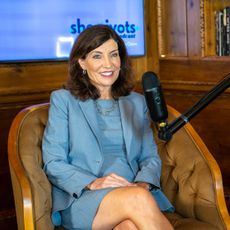 How New York's First Female Governor Plans to Fight for Women If Reelected
How New York's First Female Governor Plans to Fight for Women If ReelectedKathy Hochul twice came to power because men resigned amid sexual harassment scandals. Here, how she's leading differently.
By Emily Tisch Sussman Last updated
-
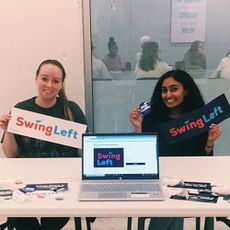 Why the 2022 Midterm Elections Are So Critical
Why the 2022 Midterm Elections Are So CriticalAs we blaze through a highly charged midterm election season, Swing Left Executive Director Yasmin Radjy highlights rising stars who are fighting for women’s rights.
By Tanya Benedicto Klich Published
-
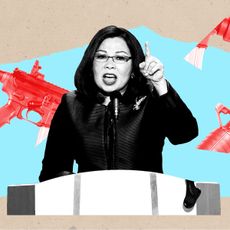 Tammy Duckworth: 'I’m Mad as Hell' About the Lack of Federal Action on Gun Safety
Tammy Duckworth: 'I’m Mad as Hell' About the Lack of Federal Action on Gun SafetyThe Illinois Senator won't let the memory of the Highland Park shooting just fade away.
By Sen. Tammy Duckworth Published
-
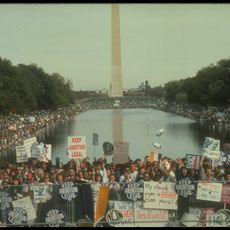 Roe Is Gone. We Have to Keep Fighting.
Roe Is Gone. We Have to Keep Fighting.Democracy always offers a path forward even when we feel thrust into the past.
By Beth Silvers and Sarah Stewart Holland, hosts of Pantsuit Politics Podcast Published
-
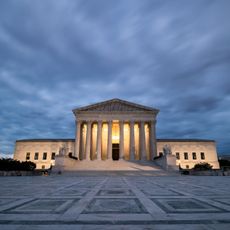 The Supreme Court's Mississippi Abortion Rights Case: What to Know
The Supreme Court's Mississippi Abortion Rights Case: What to KnowThe case could threaten Roe v. Wade.
By Megan DiTrolio Published
-
 Sex Trafficking Victims Are Being Punished. A New Law Could Change That.
Sex Trafficking Victims Are Being Punished. A New Law Could Change That.Victims of sexual abuse are quietly criminalized. Sara's Law protects kids that fight back.
By Dr. Devin J. Buckley and Erin Regan Published
-
 My Family and I Live in Navajo Nation. We Don't Have Access to Clean Running Water
My Family and I Live in Navajo Nation. We Don't Have Access to Clean Running Water"They say that the United States is one of the wealthiest countries in the world. Why are citizens still living with no access to clean water?"
By Amanda L. As Told To Rachel Epstein Published